Institutional Context
Summary
The University of Roehampton is jointly recognised as the best modern university in UK for its research and impact. Based in the borough of Wandsworth, we advance cutting-edge research that prioritises health and wellbeing, creative industries, just and inclusive societies, and economic and ecological sustainability, and the role of faith in society. Building on our proud legacy of inclusive educational provision and high-quality research, we explore opportunities for engagement with professional networks and organisations across sectors to identify their needs, co-design solutions, and support growth through innovation. We champion equality of opportunity for all, meeting the needs of diverse stakeholders through collaboration with partners who share our values to deliver outcomes that benefit society as a whole.
Institutional context
The University of Roehampton is a modern, campus-based university, located in the Borough of Wandsworth in South London. Our commitment to supporting and enriching the communities we serve through economic, social, cultural, and environmental engagement stems from our distinguished history of expanding access to higher education for underrepresented groups. Our four Colleges (Whitelands, Digby Stuart, Southlands and Froebel) were founded by faith-based and educational organisations with the explicit aim of expanding education to society’s most disadvantaged. We have been providing higher education to women since 1841, longer than any other institution in the UK. This proud legacy of widening participation is still core to our mission.
Our civic mission is articulated through our Enabling Strategies which set out to meet key regional needs and priorities. We address these needs through an array of knowledge exchange activities aligned with our five key disciplinary priorities: creative exchange, health and wellbeing, inclusive societies, faith and society, and economic sustainability and ecological conservation. The work of our staff and students meets community needs, shapes policy, and supports our sub-regional economy. We are an open university, deeply embedded in our communities, and committed to serving the needs of our diverse stakeholders.
Our Education Strategy seeks to create greater opportunities for students of all backgrounds, providing them with access to high-quality education and the skills to make a difference in society. Student community engagement is central to our knowledge exchange activity: through innovative partnerships including Wandsworth, Richmond and Merton Chambers of Commerce, Crystal Palace Football Club, and local health providers, our students meaningfully engage our local communities, whilst also benefitting from enriching experiences and knowledge.
Our Research and Knowledge Exchange strategy underpins our world-leading research and impact, developed in collaboration with a range of stakeholders across the health and life sciences, psychology, arts, digital industries and humanities, business, education and social sciences. We are expanding our challenge-led research and increasing capacity and knowledge sharing activities, by building on our success to date in working with business, arts organisations, the third sector and public services internationally.
At the same time, our civic commitment as part of the South London ecosystem shapes our engagement with local institutions and communities. We collaborate to identify key local needs and co-develop solutions. Our partners include the borough councils, hundreds of local businesses and over 600 schools, as well as major local institutions such as Kew Gardens, Royal Parks, the National Archives and the NHS. We contribute to the social and cultural enrichment of the region through partnerships, including the Wandsworth Arts and Culture Service, Wimbledon BookFest, and Barnes Children’s Literature Festival.
Our Sustainability strategy underpins all areas of our activity, informing initiatives and engagement with local partners such as the London Wetlands Centre, focused on both financial and environmental sustainability. Raising awareness and developing solutions to some to the climate crisis is a staple of both the work of our researchers – including activity developed by the Roehampton Climate Network – and students, through Growhampton, our award-winning student-led social enterprise.
For further information, please send queries to research.office@roehampton.ac.uk
Local Growth and Regeneration
Summary of approach
The University of Roehampton is a major civic institution in the Borough of Wandsworth and key local partner, driving innovation and growth across South London and beyond. We work with local government, businesses, and community organisations to identify local needs and co-develop solutions across our sub-region. We do this through student placements and continuing professional development; research which addresses regional priorities; and, through our engagement with community partners and events. Addressing important local needs, we are focused on building capacity in the health and wellbeing sector, supporting business growth and innovation, contributing to the development of arts and culture initiatives, and collaborating to raise awareness of, and mitigate, the impact of the climate emergency.
Aspect 1: Strategy
The University of Roehampton belongs to a complex sub-regional ecosystem in South London. We are a major civic institution in the Borough of Wandsworth, and directly support innovation and growth across the wider South London sub-region, including Richmond, Merton, Sutton, Kingston, and Croydon.
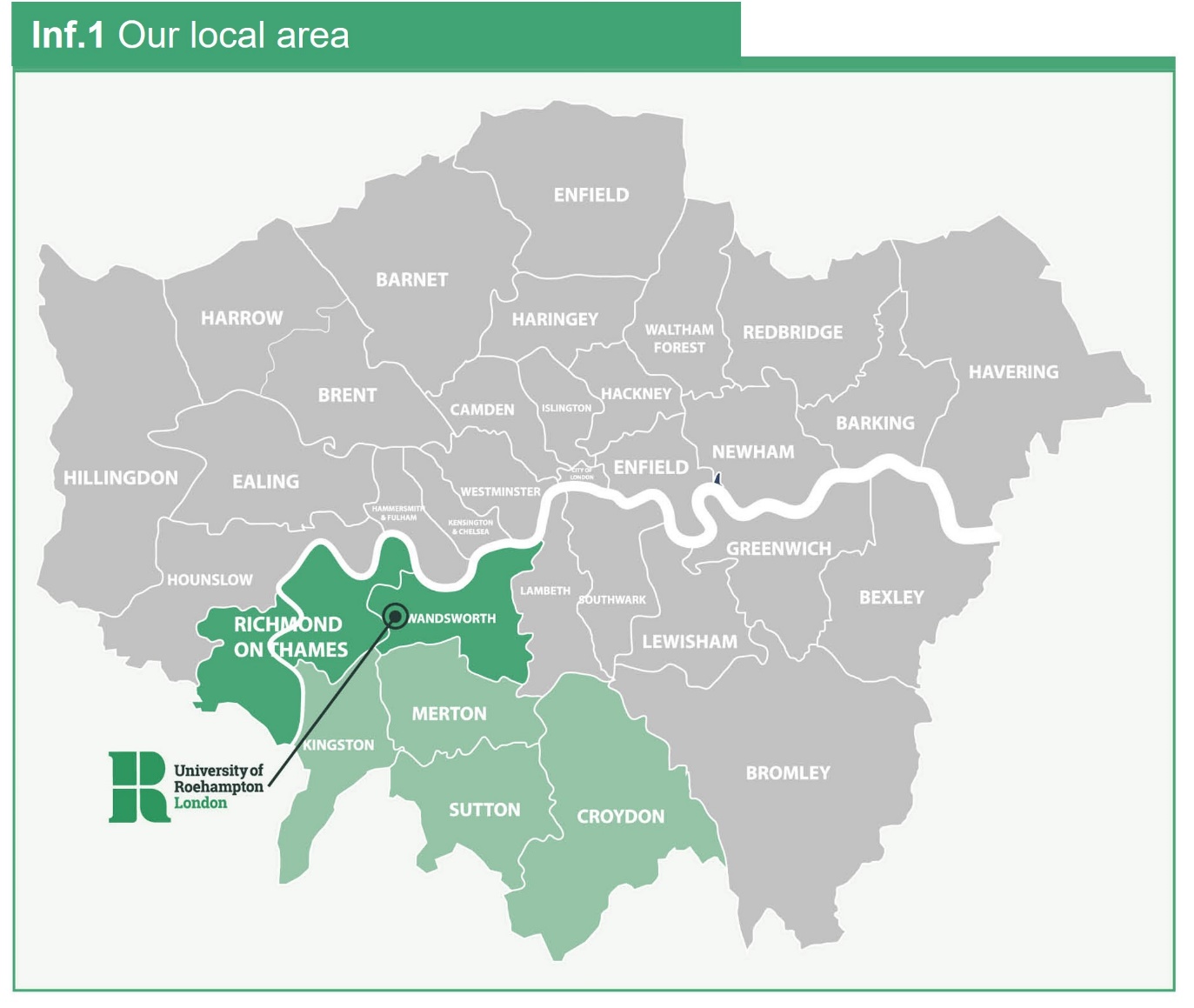
Our sub-region is defined by a young, diverse population. The local economy is predominantly comprised of services activities, health and education, and a high concentration of SMEs and microbusinesses. It is also an area characterised by socio-economic inequality. For example, the Roehampton ward, incorporating our immediate neighbours on the Alton Estate, includes areas that are among the 20% most deprived neighbourhoods in England, while Putney is characterised by high-value private housing, and Wandsworth has one of the highest employment rates in the country. This disparity is reflective of London more widely, and we work collaboratively with a range of partners to help challenge and address this context.
Identifying key local needs and developing strategies to address them
Our sub-regional development initiatives are based on an iterative understanding of community needs, developed over several years’ engagement through research projects and consultation with the local borough councils, and with third sector and community organisations. As a member of the GLA-funded Business Innovation Growth (BIG) South London initiative – South London Partnership’ (SLP) business engagement, innovation and Knowledge Exchange (KE) arm - we work with Richmond, Sutton, Kingston, Merton, and Croydon councils and thirteen local HEIs and FE partners to identify how our expertise, including that of our students, can support the social and economic needs in South London. We work together to ensure resources have the maximum impact.
We play a considerable leadership role across the sub-region which further informs our local priorities. We are represented across the SW London NHS ICS People Board, the SLP/BIG Programme Board, Putney High Street Redevelopment Board, Wandsworth Sustainability Partnership, Merton Chamber of Commerce Board of Directors, Battersea Design and Tech Quarter board, Employment and Skills Strategy Taskforce for both Wandsworth and Richmond Councils, SWL Social Care Workforce Partnership Group, South Thames College's Employer Advisory Board and South London Local Skills Improvement Plan stakeholder group.
We work closely with local stakeholders in diverse sectors, which informs our understanding of pressing needs and shapes our activity to address them. This includes the health and care sector - the largest employer in the area – including 43 hospitals and community health settings which inform our approach to addressing health inequalities. Continued growth, health inequality, and post-pandemic recovery are major challenges, including the recruitment and retention of talent, mental health needs, obesity and physical inactiveness. The lack of wider access to health services further accentuates inequalities across the local area. In response, over the last three years we have worked with local health partners to build capacity and implement initiatives to support the health sector and healthy living and mitigate social inequalities.
Creative industries are a major component of the local economy, directly connected to the development of cultural initiatives which play an important role in bringing communities together. We play an active role in the main cultural activities in the area, through our partnership with Wandsworth Arts Service, supporting the development of the local Arts and Culture Strategy 2021-2031, and partnerships with local festivals.
We maintain an engagement pipeline with over 670 businesses across the sub-region, and sustain collaboration with local Chambers of Commerce, including Wandsworth, Kingston and Merton. Despite a vibrant business community, and high concentration of SMEs and microbusinesses, the region is lagging behind London indicators for productivity, research, development and innovation. We work with businesses and charities to embed sustainable practices and innovation to support growth.
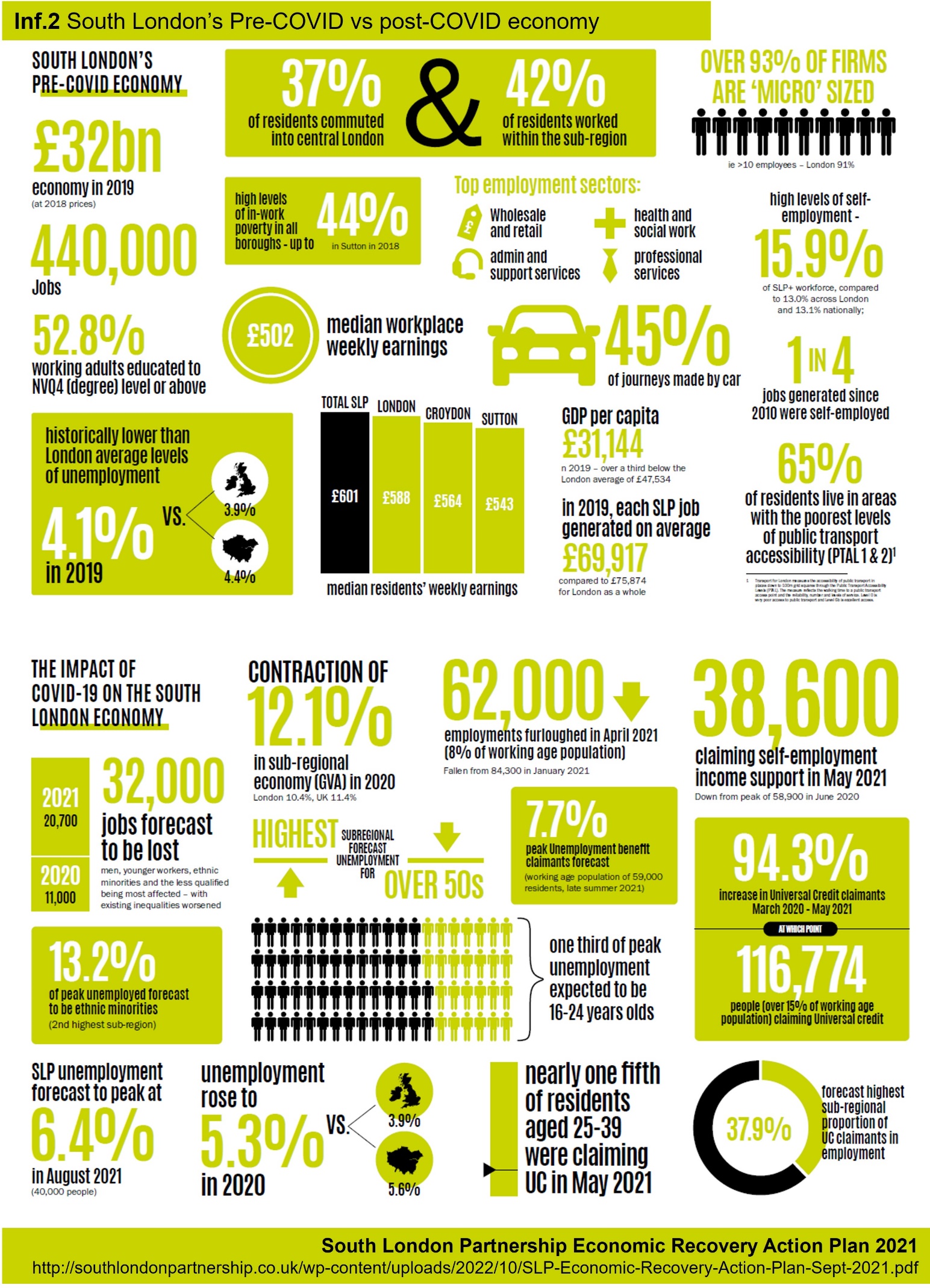
We work closely with these stakeholders and environment-focused partners such as the London Wetlands Centre, focusing on identifying and addressing environment and sustainability issues. Environmental sustainability is recognised as a local priority, with boroughs across South London having declared a climate emergency, setting out their commitments to reduce carbon emissions, educate constituents and promote sustainable practices. Research also predicts a massive increase in green jobs in the area in the next three decades, creating a need to supply the skills to promote this level of growth. We work closely with partners to raise awareness and implement actions to mitigate the impact of the climate emergency, and to support the green upskilling of the local workforce.
Aspect 2: Activity
Expanding access to health and addressing inequalities in South London
Facing the increasing need of specialised staff across health providers, we have made strategic decisions to invest in new programmes, infrastructure and collaborations which will play an important role in ensuring greater sustainability of, and access to, high-quality healthcare, addressing inequalities in the area.
In September 2019, we launched nursing training provision which offers specialisation in primary and community care, and across mental health and children’s nursing. In 2021-22, we have placed over 700 students across our nursing programmes among our local health partners. To provide the next generation of health professionals with the skills they need, we have invested in state-of-the-art health and simulation facilities. We have spearheaded the use of Virtual Reality, allowing students to experience environments through the eyes of others, for example those with cognitive impairments.
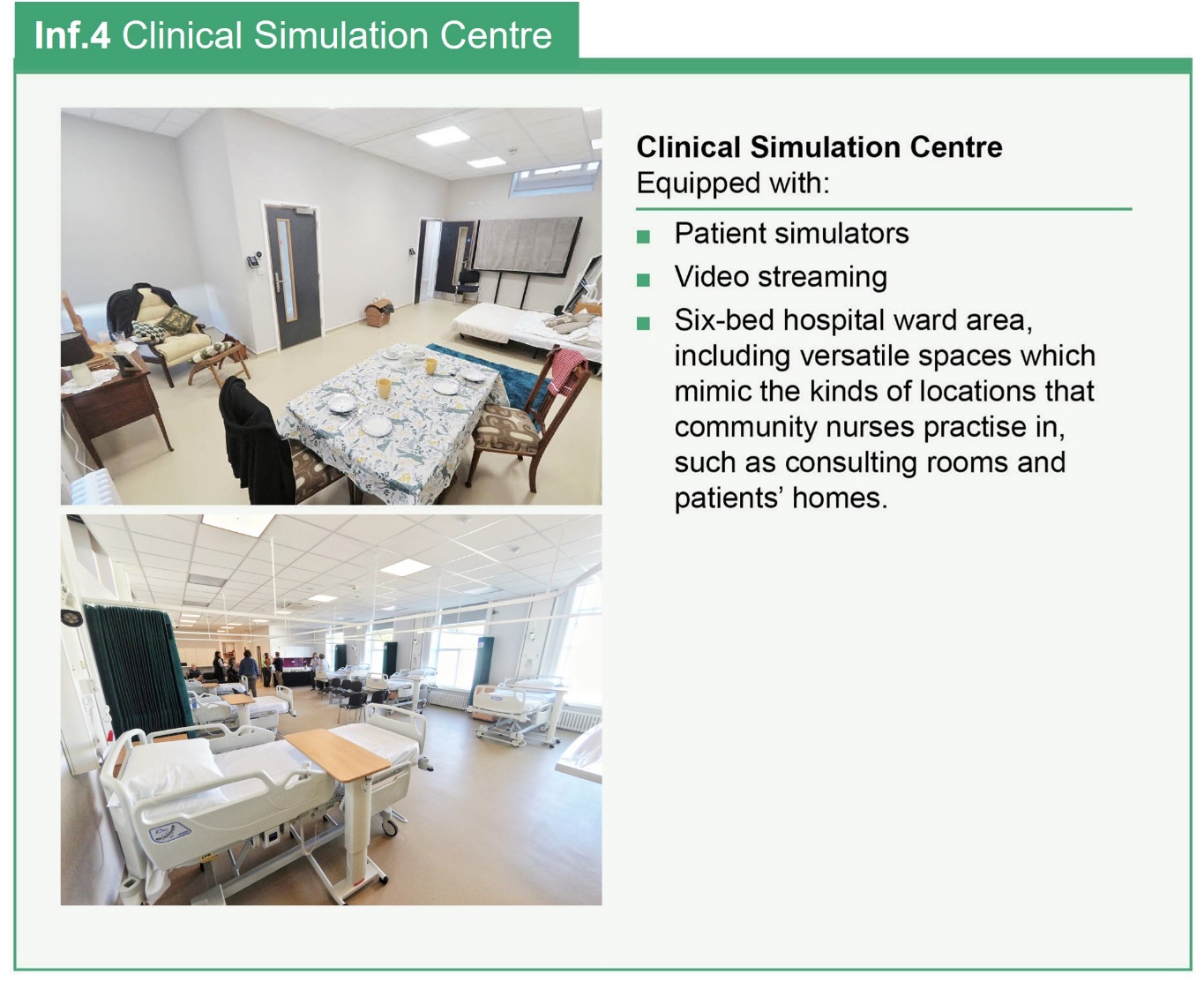
We further expanded our internal capacity with our new £3.2m Mary Seacole Health Innovation Centre (opened in September 2022) which will provide high-quality and extensive health education teaching for students and professionals with a focus on primary and community health care.
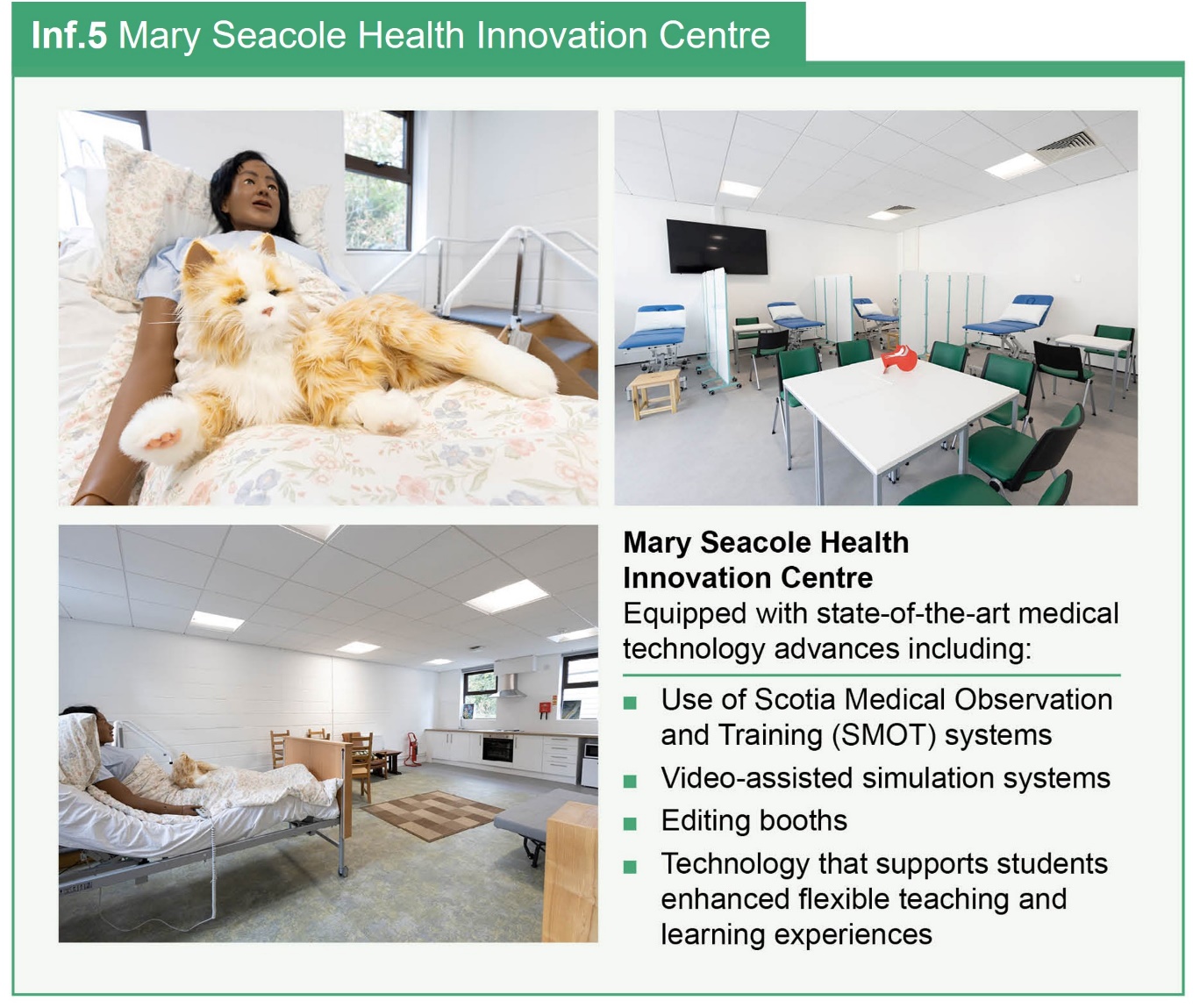
To further extend our reach across the sub-region, we co-developed the Clinical Simulation Centre in Croydon, in collaboration with Croydon College Group (opened in 2021), aiming to train the next generation of Croydon’s nurses. This work is complemented by continued investment in our Psychology-based arts therapy courses and CPD offer, addressing local capacity and mental health needs.
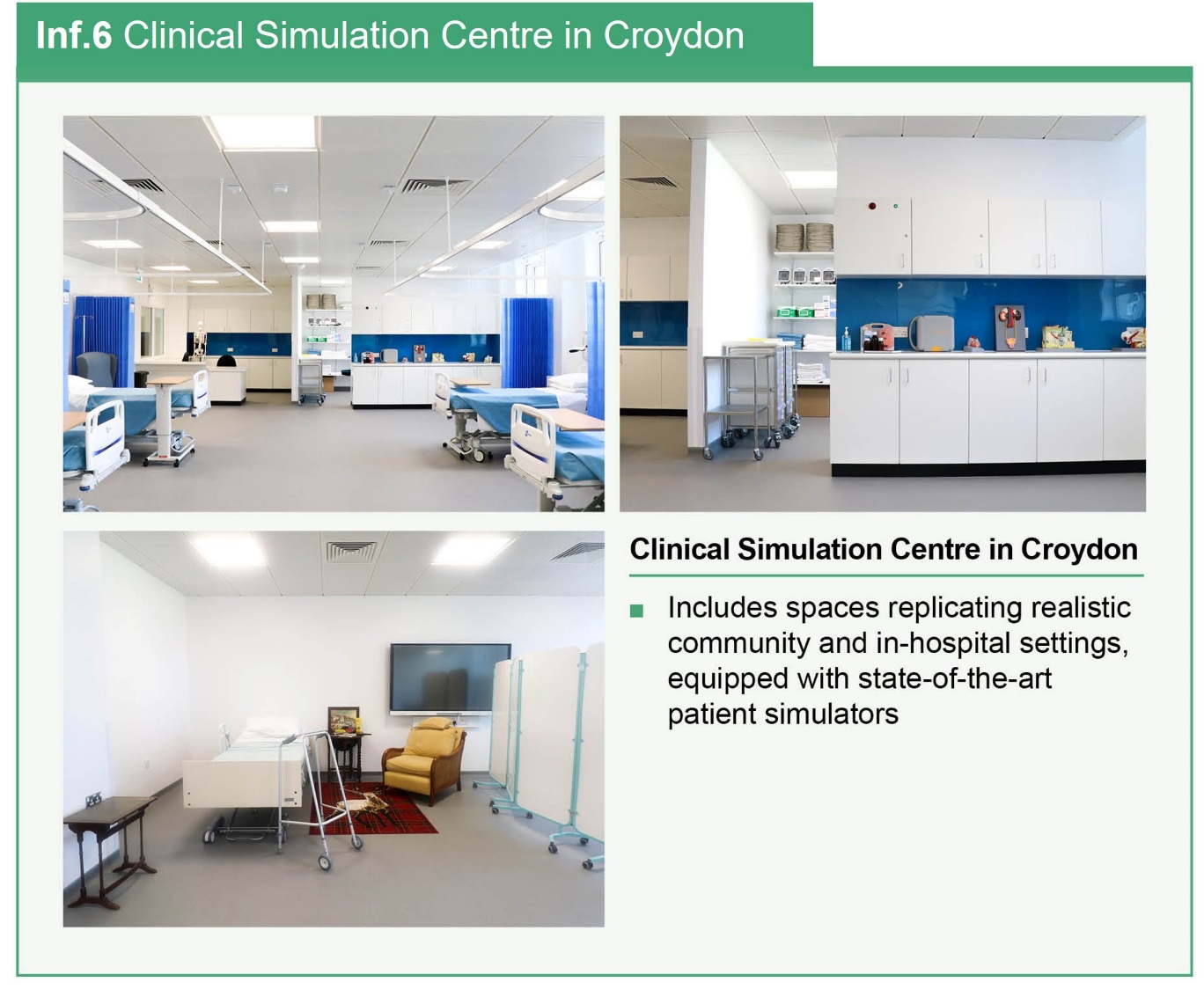
Roehampton is a key contributor to the training of Special Educational Needs Co-Ordinators (SENCOs) who provided dedicated support in schools across our local area, at a time where we are witnessing a local recruitment crisis for this role. We deliver the SENCO programme in conjunction with Merton Special School Teaching Alliance and Wandle Teaching Alliance (Wandsworth), having trained 113 new SENCOs for schools across London since 2019-20. Further expanding capacity across local schools, in 2021-22 we led a consortium to deliver the assessment board for the Church of England Foundation for Educational Leadership. This enables local and national school leaders to succeed at the DfE National Professional Qualifications. In the first twelve months, the board has supported over 1700 school leaders to achieve these qualifications.
Focusing on improving all aspects of a healthy life, we have supported activities focusing on physical exercise, hygiene, and good nutritional practices. Examples include work with local schools and communities across the Alton Estate and wider Wandsworth to tackle tooth decay and gum disease and overall improve children’s oral hygiene, and collaboration with Rackets Cubed, a national charity that supports young people from disadvantaged and underserved areas with integrated sport, education and nutrition programmes.
Roehampton played an important role in mitigating the impact of COVID-19 in the local area. In collaboration with local organisations – including the Roehampton Response Network, Estate Art and the Alton Practice – Roehampton staff co-organised outreach activities aimed to address vaccine hesitancy in the local area. Further supporting the vaccination effort across the region, many of our nursing students completed their placements at mass vaccination centres.
We both fund activities and collaborate with local partners to further address the wide scope of inequalities experienced across our local area, including the work of our Law Clinic, based on the edge of the Alton Estate, which provides access to free legal advice to our local population.
Creative industries and community building through local cultural recovery
We promote vibrant artistic and cultural activity in collaboration with a vast range of local arts and culture institutions, directly supporting the creative industries across South London. Over the last three years we have invested in innovative facilities and technology, supported the implementation of Wandsworth’s Arts and Culture strategy and continued building on our partnerships with local cultural festivals.
In 2019, we opened our new Esports Arena which provide among the best university facilities of its kind in the country, followed by our new, 2000 metre-square £13m state of the art Media Centre in 2020. These two facilities are accessible to both industry and public, aiming to be a driving force of the activity of local creative industry.
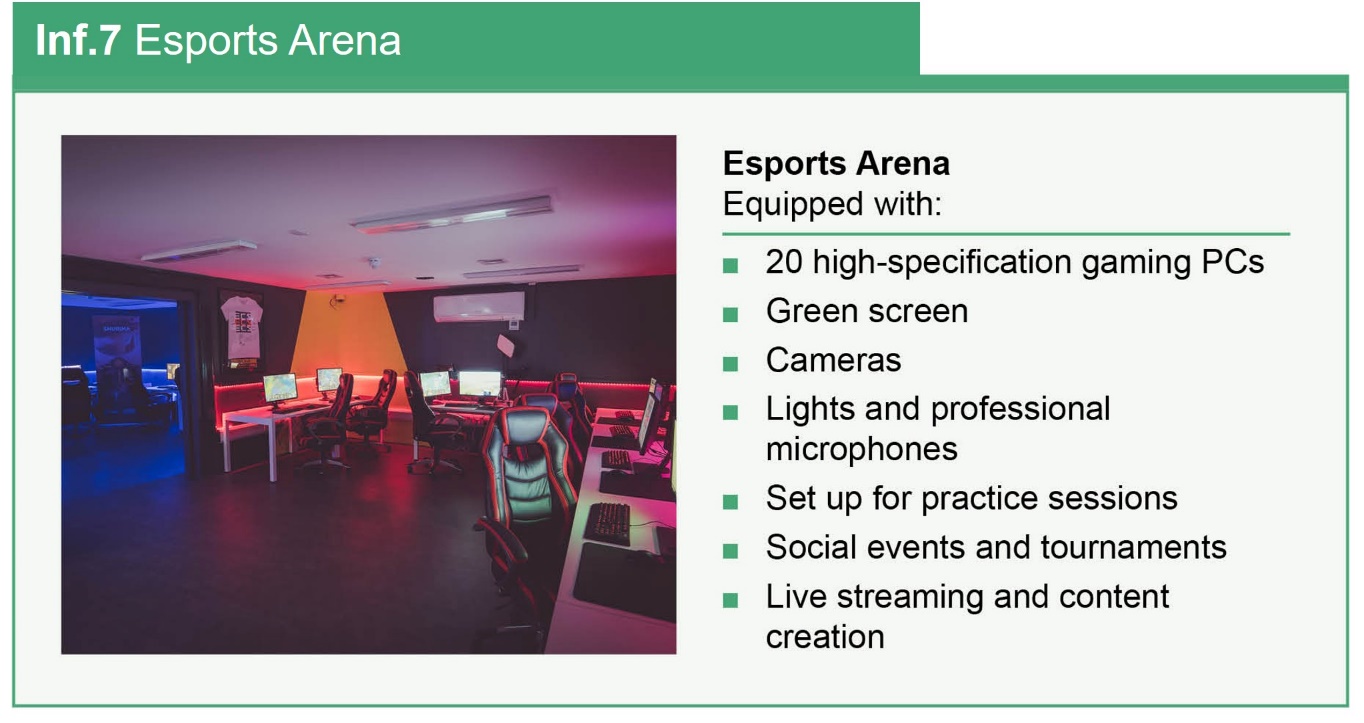
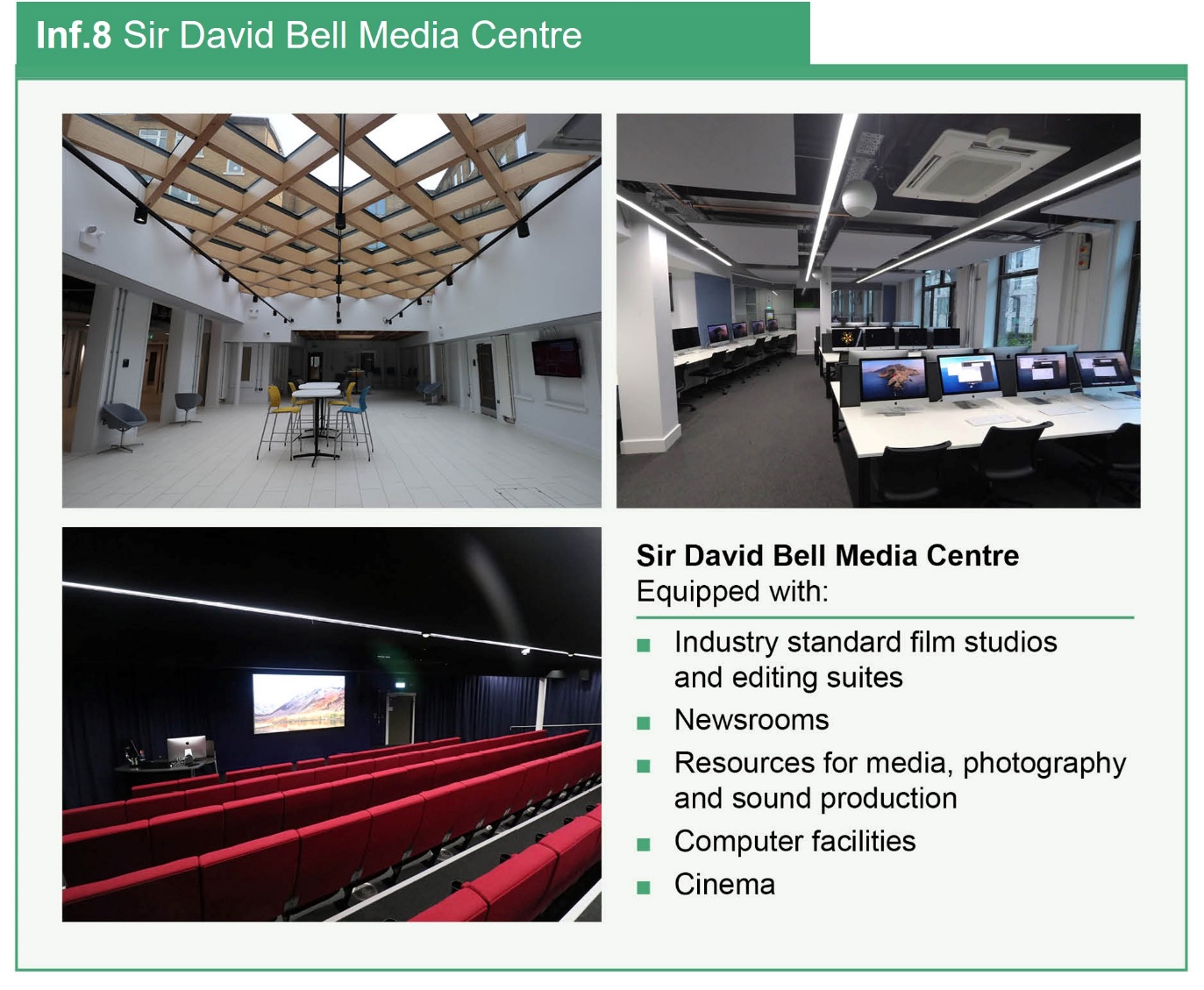
We have collaborated closely with local services, festivals, organisations and population, aiming to revitalise the cultural awareness and offer in the local area and consequently promoting community building through cultural activities. We have a close collaboration with the Wandsworth Arts Service, having supported greater engagement with the Wandsworth Museum Collection (WMC) and the local Heritage Festival.
The University remains a key partner and sponsor of local cultural festivals. We have been the official Wimbledon BookFest partner since 2018, with our academics and postgraduates contributing to the BookFest wider education programme, which reaches over 10,000 students in over 100 London schools each year, as well as providing an annual Poet in Residence, lectures, and panel discussions. The festival is a major local event which attracts over 20,000 visitors each year.
Supporting innovation and sustainable growth
Financial and environmental sustainability are key foci for our institutional activity. We work with local SMEs to embed better and more sustainable business practices, supporting business growth and innovation through partnerships, research and student engagement. We have a close working partnership with organisations focused on business development and innovation such as BIG South London and local Chambers of Commerce. Co-developed activity includes placements and internships within the chambers and their members and collaboration for research projects.
Beyond supporting innovation and business growth, we equality work alongside local stakeholders, to raise awareness to local challenges which are hindering business development. A key example is the organisation of the Transport and Regeneration at Roehampton, bringing together local MPs and London assembly members to discuss the effects of limited transport links and how it presents significant barriers to attracting new businesses and innovation within the area. Our Roehampton Climate Network (RCN), launched in April 2021, further extends our research and community engagement capacity, having promoted discussions on the Corona Crisis and the Climate Emergency, bringing together researchers and policymakers and activities as part of the Wandsworth 2021 Together on Climate Change Festival.
Aspect 3: Results
We proactively monitor and report on our activity and consequent impact in our local area. Results inform strategic planning, including our RKE strategies. Strategic RKE targets are benchmarked against previous performances across a range of measures which directly reflect the outcomes of our development initiatives to date. Community and public engagement objectives are built across the RKE structure of the university, specifically across our RKE centres. All our staff are supported to deliver on our civic mission, which is reinforced through internal communications, training sessions and internal seed-funding competitions.
The consistent evaluation of our activity demonstrates that we are fulfilling our civic role, leading initiatives that directly address the pressing local needs identified. Roehampton plays a key role in building the capacity of our local health providers and addressing local health challenges, as well as supporting artistic and cultural activity, business growth, financial and environmental sustainability, leading to more cohesive, healthy communities, bridging the local social inequalities.
Specific examples of our impact include:
Expanding access to health and addressing inequalities in South London.
We are actively building the capacity of the health partners across the area. in addition to the development of our nursing programmes, over the past three years, we have promoted 700 student placements across our Arts and Play therapy courses among 522 local and national health providers, schools, galleries and museums and have trained 1250 therapy practitioners through our CPD courses.
Our research is benefitting lives in the communities that we serve. Examples include the work supporting oral hygiene, engaging 300 children and families, reducing tooth decay particularly across local black communities which lacked access to information which would allow them to detect early stages of gum decay. Collaborative work with local charities is also addressing social inequalities. The collaboration with Sutton Night Watch led to an increase in capacity to accommodate clients (over 140) with treatment plans and vital counselling sessions, providing support to those who need it the most.
Initiatives led by Growhampton and our Law Clinic are minimising inequalities in the area, particularly through tackling food poverty and providing free legal advice. Since 2019-20, Growhampton has donated 430kg of fresh produce to local community partners. In 2021-22 alone, the Law Clinic delivered 312 hours of work on client matters and £47,000 worth of free legal advice to the community.
Mitigating the impacts of the pandemic and addressing inequalities across our local area have been central to various strands of activity delivered by our staff and students. Besides addressing vaccine hesitancy in the area, researchers have also worked to identify and address the impact of COVID-19 on the work and family lives of local families, in collaboration with local policymakers.
Creative industries and community building through local cultural recovery
Activities led by our researchers are providing greater access to cultural initiatives, bringing the local communities together. A key example is our work with the Wandsworth Arts Service and the WMC. Since its brick-and-mortar museum space closed in 2016, the WMC has been inaccessible to the public. Roehampton researchers and students are working to raise awareness and share information about the collection amongst the local population, through research and the curation of events open to the local community. The Wandsworth Diversity Past & Present exhibition - part of the 2022 Wandsworth Heritage Festival – was the first opportunity for hundreds of locals to access the collection since the closure of the museum.
Supporting innovation and sustainable growth
We support the aspirations of young entrepreneurs and work closely with local businesses to promote innovation and financial sustainability. In the last three years, we directly supported entrepreneurial activity through our annual entrepreneurship programmes, having supported 31 new enterprises.
Our researchers have supported entrepreneurial and innovation activity across the sub-region, working with local businesses, enterprises and chambers of commerce. A key example is our work with the Merton and Richmond and Kingston Chambers of Commerce which has led to the proposal of a new, sustainable business model, which is currently being implemented.
Through the collective work of RCN and Growhampton, we are informing our local communities about climate change and the climate emergency, promoting environmental sustainable practices. Every year, Growhampton organises and delivers multiple activities open to the community and directly engaging with schools across Wandsworth, focused on sustainable food growing and practices. RCN is working with local and national stakeholders to raise awareness to the impact of climate change and how everyone can play a role in mitigating it. Our contribution to the Wandsworth 2021 Together on Climate Change Festival, has reached hundreds of locals.
Public & Community Engagement
Summary of approach
Public and community engagement (P&CE) is core to the University of Roehampton’s Enabling Strategies 2019-25. Since 2019-20, our staff have carried out over one thousand public engagement activities, including public speaking events, creative performances and exhibitions, workshops and media interventions. To support the delivery of high-quality activities which respond directly to the different needs of our diverse community of beneficiaries, we have invested in P&CE through dedicated workloads for academic staff; pump-priming resources; and a Research and Knowledge Exchange Development (RKED) team who provide support in planning, delivery and monitoring the impact of activities. We conduct robust analyses of previous success to drive continuous improvement of our engagement approach.
Aspect 1: Strategy
Institutional Strategy and oversight
The University of Roehampton has a strong civic identity, and P&CE is central to the increasingly role we play in supporting our sub-region’s economy, culture and society. Our approach to P&CE is articulated in our Research and Knowledge Exchange (RKE) Strategy, which sets out the framework for P&CE, focused on connecting with the communities we serve, growing links with external organisations, and driving impact. Our strategy is aligned with the principles set out in the KEF, and we aim to be recognised as one of the top 5 HEIs for P&CE in our KEF cluster. Progress towards this objective is overseen by RKE Committee and Senate, with strategic planning, delivery, and the evaluation of outcomes being embedded across the institution.
Stakeholder Mapping
We had traditionally identified stakeholders through a) affinity with our research themes and areas of strategic focus, and b) engagement with communities, institutions and industry partners who share our values. While these remain important criteria in guiding our P&CE strategy, we are adopting a more responsive approach to our main research users, partners and collaborators, which is shaping P&CE activity and the diversity of our engagements. We engage our partners, collaboratively identify their needs, and co-develop activity to address them.
Our research strengths make us a valuable partner for businesses, charities and third sector organisations across a broad spectrum of activity, from health to the creative arts, cultural, and environmental sectors. Examples of our partners include organisations:
in our local area including the Wandsworth Arts Service and the London Wetland Centre;
in South London and wider London (BIG South London and Shakespeare’s Globe);
across the UK (National Ballet and Spalding Gentleman’s Society);
on an international level (UNICEF and UNESCO).
Resources
We have dedicated significant resources to support P&CE, through workload allocations for research and knowledge exchange (KE) activities respectively – ensuring that researchers have dedicated time for P&CE - as well as providing pump-priming funds which support the development of new collaborations. We have invested in our professional services which support all P&CE activity, including our dedicated RKED team, and Business Development and Communications teams, which further extend our external engagement and scaled media reach capacity.
Continuous monitoring and improvement
Performance is benchmarked internally against our targets for P&CE, qualitative and quantitative evaluations to understand our reach and impact, and externally through exercises including the Research Excellence Framework, KEF, and the annual Higher Education Business and Community Interaction Survey (HE-BCIS). The results of this ongoing benchmarking activity inform our future strategies.
Aspect 2: Support
Leadership and Governance
The University has in place a robust RKE governance structure to ensure that related activity - including P&CE - are properly resourced, developed and recognised. The RKE Committee receives bi-annual reports on progress against targets, while the regular Vice-Chancellor’s report to Senate and Council includes a dedicated section on P&CE metrics and achievements. The Civic and Corporate Partnerships Board, composed of colleagues with significant responsibility for external engagement, meets regularly to explore opportunities for collaboration with external partners. Academic Deans and RKE Directors are responsible for operationalising institutional P&CE goals across their individual units and support the monitoring of achievements against KPIs. Key relevant institutional KPIs include the success of our applications for external RKE funding – which include plans for P&CE – as well as records of individual P&CE activity.
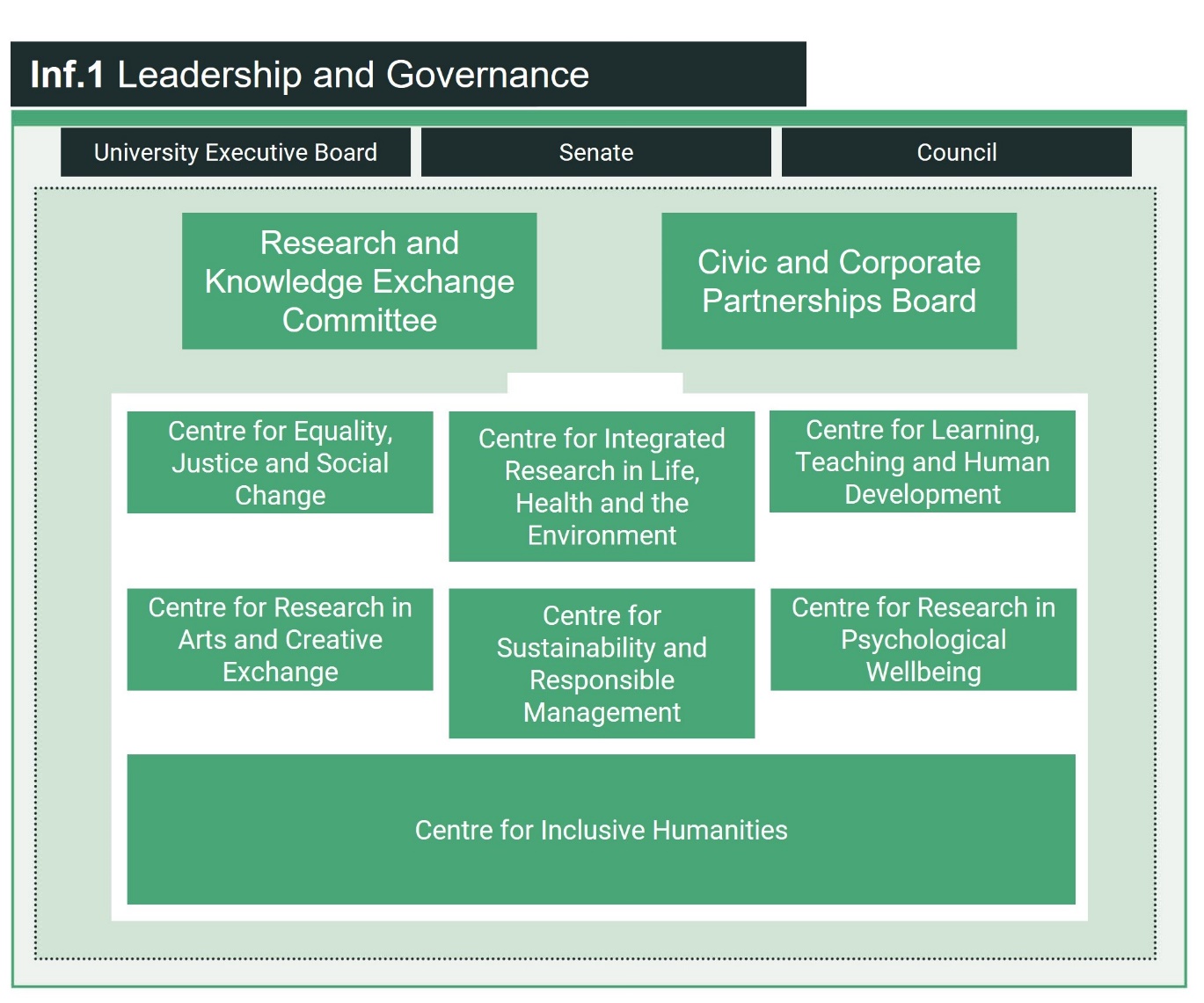
Infrastructure and resources
In response to national, regional and local priorities, in 2020-21 we launched a new infrastructure in the form of seven RKE Centres, building on key strands of research excellence in Life and Health Sciences and Psychology, Arts, Humanities and Social Sciences and Business. This new structure promotes interdisciplinary collaboration and act as hubs to facilitate external collaboration and partnerships and build capacity for real-world impact.
RKE activity is supported by our RKED team, who provide dedicated support to all researchers across the institution, enabling the planning, stakeholder mapping, delivery and evaluation of P&CE activity. They are core members of RKE Centre steering groups and provide support to all academics, while also developing and delivering bespoke training programmes that meet our staff’s knowledge and skills needs.
We recognise that excellence in P&CE activities requires an investment of academic time. To ensure this, we have maintained investment in workload allocations from 2019 onwards (up to 40% of a full-time employees’ time) to support research and KE across all areas of activity. Staff have been supported to build P&CE into their research plans, however, during 2021-22 we have worked in developing a new academic responsibilities framework to ensure that KE and P&CE are recognised as key components of academic activity in their own right. This change ensures that P&CE is recognised alongside high-quality research and teaching. Workload allocations for KE are reviewed annually, ensuring sustained investment in P&CE, and alignment with key strategic priorities across the RKE Centres.
All researchers also have access to competitive central funds which are used to pump-prime P&CE activity. In 2021-22 alone, we have awarded seed-funding for projects in collaboration with partners such as McLaren, Age UK Westminster and Home-Start Wandsworth, all including P&CE activities such as engagement professionals with new practices, consequently impacting their work and benefitting the communities they serve.
Aspect 3: Activity
Since 2019-20, we delivered over one thousand P&CE activities, including public speaking events reaching a wide array of audiences and communities, creative performance and exhibitions, schools’ engagement, workshops and media appearances (press, radio and TV). Within our research themes, the following initiatives exemplify our approach to P&CE and the consequent impact of our efforts:
Inclusive societies
Colleagues across Roehampton advocate for social justice and inclusivity and have demonstrated a commitment to engaging with diverse public and communities to create a safer world where all are protected from discrimination and violence. They have addressed intersectional inequality by engaging with staff from global law and accounting firms to create a work-life balance cycle intended to protect the wellbeing of employees, disseminating the findings of their work through through the Harvard Business Review and BBC Worklife platforms. Researchers have influenced and encouraged inclusive practice within the heritage and creative sectors, creating innovative ways for diverse history and practices to be shared with new audiences. In collaboration with The Globe, Professor Clare McManus developed and delivered training on gender, disability and race in early modern performance with docents, guides and educational practitioners which has the potential to change the experience of 1.25m annual visitors.
Researchers have worked to engage communities in promoting fairer access to education. Key examples include the work of Professor Bryony Hoskins, who co-developed (with UNICEF) and supported the implementation of new life skills and citizenship education programmes in schools in North Africa and the Middle East. In the UK, she is an active member of the Academic Advisory Group to the All-Party Parliamentary Group on Political Literacy.
Our researchers use engagement with multiple stakeholders and media appearances to mitigate and raise awareness of violent acts, particularly the ones impacting minority and at-risk communities. They have raised the profile of gender-based violence by acting as lead experts in documentaries such as Murdered by my husband on Channel 5. Dr Amanda Holt worked with London’s Violence Reduction Unit to assess Child/Adolescent to Parent Violence and Abuse and ensure a robust evidence base for services and support for young people and families. She co-authored a report on student’s aggressive behaviour towards teaching and classroom assistants whose recommendations are being adopted by UNISON.
Faith
Through their engagement with religious charities like the Southlands Methodist Trust, colleagues have worked with ‘older Christians’ in Methodist, Anglican, Baptist, Roman Catholic and Vineyard churches in and around Roehampton to enhance the communities’ understanding of creeds as a religious practice. Combining faith-based approaches with environmental sustainability, our theologians are engaging with churches in close collaboration with Operation Noah, a Christian climate charity that works to encourage churches to think and act more sustainably, for example by divesting from fossil fuels and investing in climate solutions like renewable energy.
Health and Wellbeing
Our researchers have worked with multiple stakeholders to address challenges posed by the COVID-19 pandemic, supporting and shaping public awareness and opinion as well as policy. Evidence provided by Roehampton researchers was included in the Parliamentary Office of Science and Technology Report on the mental health impacts of COVID-19 on NHS staff. This report underpinned the NHS England and NHS Improvement’s decision to invest £15 million in rapid mental health assessment and treatment for England’s 1.2 million FTE NHS staff. Colleagues also shared their research addressing the physical and mental health concerns posed by the pandemic with the public through features in mainstream media outlets. These include pieces by Dr James Davies on the over-prescription of drugs for mental health during and after the pandemic in the Telegraph, the Daily Mail, The Times and Psychology Today, and the inclusion of Professor Fulvio D’Acquisto research into the effects of COVID-19 lockdowns on our immune systems in a BBC One documentary ‘Boosting Your Immune System’ (6 million viewers).
Creative enrichment
Colleagues have worked to engage wide public audiences to share research which provides new perspectives on history and world heritage. Through the podcast History Hit with Dan Snow, and interviews on local BBC radio stations from Froyle to Kent, our historians have reached over 10m listeners on topics as diverse as the Emperor Nero, the execution of Charles I and the 2020 U.S. Election. In March 2020, the A Bit Lit platform was launched, with videos showcasing the work of creatives, makers and researchers in a fun, informal way reaching 61,247 views.
Roehampton colleagues have contributed extensively to festivals on four continents, including the International Moving Film, New York Short Film, Tokyo Documentary Film and Women over 50 Film Festivals, earning accolades including the Official Selection at the London International Short Film and Experimental Music and Dance Film Festivals. Our researchers have curated festivals – such as the International Sans Souci Festival of Dance Cinema - and have given talks at the Battle of Ideas and Cheltenham Poetry festivals, Festival Shakespeare Buenos Aires, and the World Festival of Poetry.
Sustainability
The Roehampton Climate Network organises public-facing events bringing together experts, policymakers and other stakeholders to showcase research relating to the climate crisis. Examples include a discussion on the Corona Crisis and the Climate Emergency with the then Shadow Minister for Business Energy and Industrial Strategy, Dr Alan Whitehead, and participation in the Wandsworth 2021 Together on Climate Change Festival, reaching hundreds of local residents.
Aspect 4: Enhancing practice
Our institutional approach to supporting, evaluating and recording all information concerning P&CE is operationalised through constant monitoring of achievement against institutional and unit-level KPIs, dedicated support by our RKED team and through recording information of activity in PURE, our research database. The KPIs established for each Centre in 2021-22 were designed to collectively meet institutional objectives as articulated in our Enabling Strategies, while providing us with more granular indicators of activity, the size and scope of audiences, stakeholders and communities reached and consequent impact.
Outcomes are reviewed internally through governance structures at all levels and benchmarked against institutional KPIs. As a signatory of the KE Concordat, our action plan sets out our commitment to, and methodology for, continuously monitoring our activity and regularly reviewing our processes, to ensure that meaningful KE is adequately and effectively supported across our university.
Researchers work with the RKED team to plan activities, develop assessment tools – such as surveys and testimonials –collect and capture evidence, and follow up with the relevant stakeholders. Evaluation requirements have also been built into our competitive central funding process, ensuring that all activity is adequately monitored and assessed. Individual innovation outputs and impact evaluation are also set for all projects co-funded and developed with BIG South London and local businesses and charities, with a particular focus on innovation outputs such as creation of new jobs, products and services.
Academics are supported to include information of all P&CE activity in PURE. We are constantly reviewing our use of PURE, and in 2021-22 we have revamped the system’s capacity to record P&CE activity to account for different types of activity, such as public speaking engagements, work with schools and media, increasing our capacity to capture and accurately account for all activity.
The RKED team is responsible for developing and deliver training, both at an institutional level and also dedicated, 1:1 training to address individual needs. They manage our centralised Research Services internal webpage, which provides essential tools and information on KE and P&CE, stakeholder engagement, partnership brokerage and assessment of activities, which is accessible to all researchers across the institution.
Aspect 5: Building on success
Achievement of P&CE strategy and objectives
We have made significant progress in embedding P&CE across the University and delivering our strategic objectives. We are increasing the number of P&CE activities we deliver and the audiences we reach, and also the significance of our engagement with external stakeholders, from local to international partners, tailoring our activity to their needs, consequently increasing the impact on the communities and audiences we serve. Analyses of our RKE grant capture and centre-level records of P&CE activity show that we are substantially increasing the capacity, significance and reach of P&CE activity, with 2021-22 being our most successful year in external funding capture and reach of external audiences.
Monitoring capacity, refining support and sharing progress
We review the effectiveness of our RKE structure and support mechanisms to ensure they are efficient, effective and suited to our activity portfolio. Recent changes to both our research and support structures – including the new RKE Centres and implementation of unit-level KPIs, revised academic responsibilities framework, restructured RKED team and creation of the Director of Business Development role - is a direct result of this continuous review and has enabled us to increase our engagement with external partners and build our capacity to promote and deliver more meaningful P&CE.
P&CE progress and achievement is reported across all governance bodies, being monitored by RKE Committee and Senate, informing strategy development. Input from external stakeholders and communities – facilitated through participation in our School-level advisory boards - is essential to our understanding of key local, regional and national priorities, further informing our activity. We are permanently striving towards improving our communication with all relevant stakeholders, which is currently achieved through a single access point - our website – where we share constant updates concerning all P&CE achievements, as well as annual overviews of activity through our Annual Report and Financial Statements.
Our communications team and external PR partners work closely to expand the awareness, reach and potential impact of P&CE activity through social media channels and engagement with local, national and international media outlets. The impact of our P&CE activity is a focus point of institutional receptions which are organised throughout the year for our collaborators and representatives from the communities we serve. These are a valuable additional opportunity for engagement where we discuss their needs, feedback on our activities, find common ground for discussion and spark ideas for future collaboration.
Note You are currently viewing the latest version of this narrative statement. View the previous version as published in previous iterations of the KEF (KEF1 and KEF2)